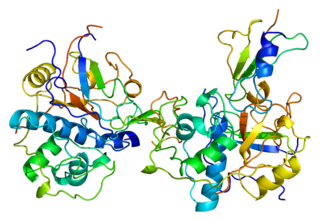
HLA class II histocompatibility antigen gamma chain also known as HLA-DR antigens-associated invariant chain or CD74, is a protein that in humans is encoded by the CD74 gene. The invariant chain is a polypeptide which plays a critical role in antigen presentation. It is involved in the formation and transport of MHC class II peptide complexes for the generation of CD4+ T cell responses. The cell surface form of the invariant chain is known as CD74. CD74 is a cell surface receptor for the cytokine macrophage migration inhibitory factor (MIF).

HLA class II histocompatibility antigen, DP(W2) beta chain is a protein that in humans is encoded by the HLA-DPB1 gene.
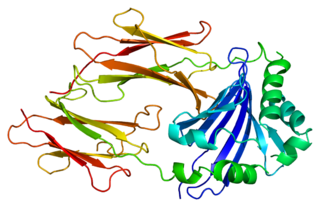
HLA class II histocompatibility antigen, DM beta chain is a protein that in humans is encoded by the HLA-DMB gene.
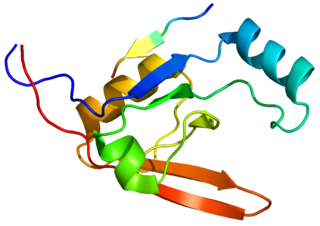
Serine protease HTRA1 is an enzyme that in humans is encoded by the HTRA1 gene. The HTRA1 protein is composed of four distinct protein domains. They are from amino-terminus to carboxyl-terminus an Insulin-like growth factor binding domain, a kazal domain, a trypsin-like peptidase domain and a PDZ domain.

Kallikrein-related peptidase 4 is a protein which in humans is encoded by the KLK4 gene.
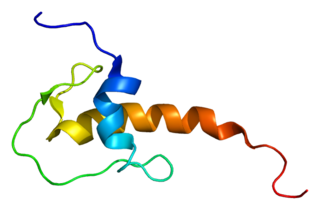
Lympho-epithelial Kazal-type-related inhibitor (LEKTI) also known as serine protease inhibitor Kazal-type 5 (SPINK5) is a protein that in humans is encoded by the SPINK5 gene.

Kallikrein-11 is a protein that in humans is encoded by the KLK11 gene.

Minor histocompatibility antigen H13 is a protein that in humans is encoded by the HM13 gene.

Large proline-rich protein BAT2 is a protein that in humans is encoded by the BAT2 gene.

HLA class II histocompatibility antigen, DQ(6) alpha chain is a protein that in humans is encoded by the HLA-DQA2 gene. Also known as HLA-DXA or DAAP-381D23.2, it is part of the human leucocyte antigen system.

Prostasin is a protein that in humans is encoded by the PRSS8 gene.

CAMP responsive element binding protein-like 1, also known as CREBL1, is a protein which in humans is encoded by the CREBL1 gene.

Serine protease 23 is an enzyme that in humans is encoded by the PRSS23 gene.

Serine/threonine-protein phosphatase 1 regulatory subunit 10 is an enzyme that in humans is encoded by the PPP1R10 gene. This gene lies within the major histocompatibility complex class I region on chromosome 6.

Serine/threonine-protein kinase 19 is an enzyme that in humans is encoded by the STK19 gene.

CD205 also called Lymphocyte antigen 75 is a protein that in humans is encoded by the LY75 gene.

Transmembrane protein 222 is a protein that in humans is encoded by the TMEM222 gene. One notable feature of the protein encoded by this gene is the presence of three predicted transmembrane domains. The TMEM222 protein is predicted to most likely localize to the secretory vesicles.

Tripartite motif-containing protein 15 is a protein that in humans is encoded by the TRIM15 gene.

Brain-specific serine protease 4 (BSSP-4), also known as serine protease 22 or tryptase epsilon, is an enzyme that in humans is encoded by the PRSS22 gene.
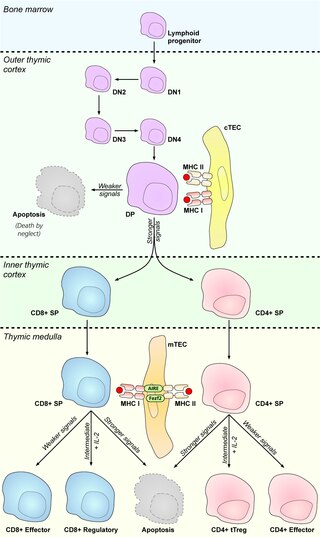
Cortical thymic epithelial cells (cTECs) form unique parenchyma cell population of the thymus which critically contribute to the development of T cells.


















